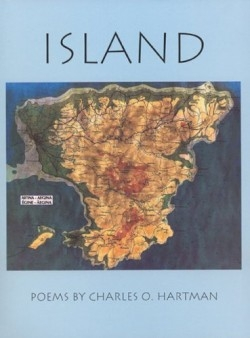Island
This collection of poems demonstrates how creative restrictions are not always drawbacks. The poet’s first section, “Tambourine,” adheres to pi mnemonics: the number of letters in each word must match the digits of pi. (For example, the words “Now: / I walk a coast” reflect 3.1415.) Translation confines the “Eight Greek Lyrics,” and the subject matter-the island of Aegina-restricts the entire work. Rather than limiting Hartman, these obstacles focus him. He is able to complete the not-so-easy task of capturing a community’s character in verse.
The key to this undertaking is attention to detail. In the section “Morning Noon & Night,” Hartman includes seventy brief poems, each addressing a single element of Aeginetan life-a man searching for mermaid tailbones, a woman cleaning her hair, the lottery, the beach, even egg salad. With this steady accumulation of scenes, objects, and insights, Aegina slowly emerges. However, the island never becomes familiar, not even to the speaker. This locale is decidedly different from anywhere else he has journeyed, evident from his confession, “I take for granted the mappedness of any place I’m likely to find myself in.” This statement refers to the unreliability of Aegina’s maps, but it also reflects the speaker’s outsider status.
Hartman’s appreciation of the island is clear, yet he remains distanced from the action. Although impartiality might produce a more accurate portrait, one counter-effect is the suggestion that the poet is not invested. To read only one of the poems in Island is not stirring; the accomplishment of Hartman’s collection is only obvious when taken as a whole. The poem “Still Life” sketches a street, complete with “the window of the butcher’s shop / a lamb with its stark-naked head / and a pig that still retains / his two shapely ears.” Such stillness taken out of context does not do justice to the spirit of Aegina evoked by Island in its entirety.
This ambitious collection is worthy of Hartman, who is an English professor and Poet in Residence at Connecticut College. His willingness to push the limits of poetry is apparent in his past exploration of computer poetry, discussed in his prose work Virtual Muse: Experiments in Computer Poetry. Island is avant-garde in some respects, but it is also grounded in tradition. The work’s title track, the Greek lyric “Island,” concludes, “When we finished what we went for we came back.” By the book’s conclusion, Hartman can leave the pistachios and vacationing Athenians in Aegina at his leisure-he has captured the essence of the island.
Reviewed by
Erica Wright
Disclosure: This article is not an endorsement, but a review. The publisher of this book provided free copies of the book to have their book reviewed by a professional reviewer. No fee was paid by the publisher for this review. Foreword Reviews only recommends books that we love. Foreword Magazine, Inc. is disclosing this in accordance with the Federal Trade Commission’s 16 CFR, Part 255.

